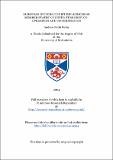Files in this item
European integrationist influences on member states' counter-terrorist co-operation and co-ordination
Item metadata
| dc.contributor.advisor | Wilkinson, Paul | |
| dc.contributor.author | Dalby, Andrew K. | |
| dc.coverage.spatial | x, 489 p. | en_US |
| dc.date.accessioned | 2018-06-21T12:04:48Z | |
| dc.date.available | 2018-06-21T12:04:48Z | |
| dc.date.issued | 2004 | |
| dc.identifier.uri | https://hdl.handle.net/10023/14394 | |
| dc.description.abstract | Under the competences of the European Union's intergovernmentally controlled Justice and Home Affairs policy, counter-terrorist co-operation and co-ordination of efforts have progressed at a rapid pace following the 11 September attacks on the USA. Given, however, that Europe has experienced entrenched terrorist campaigns for the past three decades, one could be forgiven for questioning, in light of the unique co-operative position of Western Europe, why it has taken so long for the membership of the EU to reach a common definition of terrorism. Also why is it that even now, the EU has failed to develop a common policy against terrorism? Political explanations are traditional responses to such questions, but there is a risk of underestimating the complexities of the European Project, and the effect which this has had on so many areas of transnational co-operation. By focusing therefore on the often-overlooked role played by European integration on counter-terrorist co-operation, in addition to empirical analysis of the efficiency of the co-operative structures, we place ourselves in a more beneficial position to understand the current situation. Intergovernmentalism, the controlling force of JHA co-operation, we find is not mutually exclusive to law-enforcement co-operation. Two theories tested for supranational influences - neo-functionalism and federalism - have also played their part, from the early 1960s onwards, in facilitating co-operation. The historical emphasis is important, because co-operation prior to the regulation of much of this area within the EU, following the Treaties of Economic Union, provides us with ample material for analysis and greater insight into the JHA process and counter-terrorism. Intergovernmentalism has helped push counter-terrorist co-operation along, but equally we find that it now serves as a hindrance in completing its development because of its in-built tendency to retain subsidiarity. Counter terrorist co-operation, we conclude, need not be restricted to intergovernmental control any longer. | en_US |
| dc.language.iso | en | en_US |
| dc.publisher | University of St Andrews | |
| dc.subject.lcc | HV6433.E85D2 | |
| dc.subject.lcsh | Terrorism--Prevention--Government policy--European Union countries | en |
| dc.subject.lcsh | Interorganizational relations--European Union countries | en |
| dc.subject.lcsh | Justice, Administration of--European Union countries | en |
| dc.title | European integrationist influences on member states' counter-terrorist co-operation and co-ordination | en_US |
| dc.type | Thesis | en_US |
| dc.type.qualificationlevel | Doctoral | en_US |
| dc.type.qualificationname | PhD Doctor of Philosophy | en_US |
| dc.publisher.institution | The University of St Andrews | en_US |
This item appears in the following Collection(s)
Items in the St Andrews Research Repository are protected by copyright, with all rights reserved, unless otherwise indicated.

